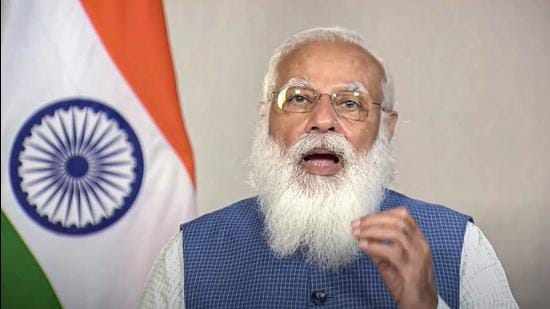Pandemic may reshape world order, says PM Modi
“The Covid-19 pandemic has presented us an opportunity to reshape the world order, to reorient our thinking. We must create systems that address the problems of today and challenges of tomorrow,” PM Modi said.
The Covid-19 pandemic is an opportunity to reshape the world order and put in place systems that can tackle the problems of today and challenges of tomorrow through an inclusive approach, Prime Minister Narendra Modi said on Tuesday.

Noting that India has supplied vaccines to more than 80 countries despite many constraints, Modi said while addressing the inaugural session of the Raisina Dialogue that the country will continue to share its expertise and resources with the whole of humanity to fight the pandemic.
The Raisina Dialogue is the external affairs ministry’s flagship conference on geopolitics and geoeconomics that is being held this year as a fully digital event because of a spike in Covid-19 cases around the world. More than a dozen foreign and defence ministers were earlier expected to attend the event in person.
“The Covid-19 pandemic has presented us an opportunity to reshape the world order, to reorient our thinking. We must create systems that address the problems of today and challenges of tomorrow,” Modi said.
“And we must think of the entire humanity and not merely of those who are on our side of the borders. Humanity as a whole must be at the centre of our thinking and action,” he added.
Since the Covid-19 outbreak, the Indian government has pushed for reforms in global institutions such as the United Nations and the WHO, saying their outdated methods of working leave them unable to cope with current challenges.
Modi said the horrors of the first and second World Wars “compelled the emergence of a new world order” and the creation of structures and institutions that were focused on only one issue – preventing a third World War. He suggested this was the wrong issue to focus on and the measures taken were akin to “treating a patient’s symptoms without addressing the underlying causes”. He said: “In fact, while humanity has not faced the third World War, the threat of violence has not reduced...With a number of proxy wars and unending terror attacks, the prospect of violence is ever present.”
The world community would have been better served, Modi said, if all countries had focused on issues such as the causes of famine and hunger and poverty, and the lack of cooperation to address problems that threaten the entire humanity. “I’m sure that if our thinking has been along such lines, very different solutions would have emerged.”
Modi also suggested that countries around the world were still trying to control the pandemic because the concern for welfare of humanity was left behind in the race for economic development, and the spirit of cooperation was forgotten in an age of competition.
He called on the participants of the Raisina Dialogue this year to forge a human-centric approach. He noted that people are used to having a “Plan A and Plan B”, but “there is no Planet B, only planet Earth”.
Against the backdrop of a domestic debate on whether India should continue vaccine exports at a time when the need of doses for the national immunisation programme is growing, Modi said India will continue sharing its resources with the world. “During this pandemic, in our own humble way, within our own limited resources, we in India have tried to walk the talk. We have tried to protect our own 1.3 billion citizens from the pandemic. At the same time, we have also tried to support the pandemic response efforts of others,” he said. India encouraged a coordinated response to the crisis in its neighbourhood, and it shared medicines and protective equipment with more than 150 countries. “We understand fully that humankind will not defeat the pandemic unless all of us, everywhere, regardless of the colour of our passports, come out of it. That is why, this year despite many constraints, we have supplied vaccine to over 80 countries,” Modi said.
“We know that the supplies have been modest. We know that the demands are huge. We know that it will be a long time before the entire humanity can be vaccinated. At the same time, we also know that hope matters,” he said. “It matters as much to the citizens of the richest countries as it does to the less fortunate. And so we will continue to share our experiences, our expertise and also our resources with the entire humanity in the fight against the pandemic,” he added.






